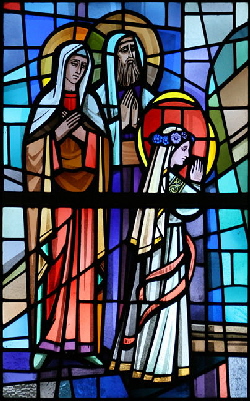|
|
 |
 |
|
Hear, O daughter, consider, and incline your ear; forget your people and your father's house; and the king will desire your beauty. Since he is your lord, bow to him; the people of Tyre will beg your favor with gifts, the richest of the people Instead of your fathers shall be your sons; you will make them princes in all the earth. (Psalms 45: 10 - 12, 16)
|
 |
 |
|
They only made temporary shelters for sleeping, usually in the woods or on a mountain. They begged for food for their sustenance. For their way of life they did not need any possessions. St. Maximillian Kolbe, who was a Conventual Franciscan, promoted total consecration to Jesus through Mary, primarily through a newspaper they published. They needed a place and a printing press and all the accessories to accomplish this. For them, owning property and certain possessions was a necessity to fulfill their purpose. He believed in using the best materials possible so as to serve Our Lady best, so when a brand new printing press came out that could increase the output of the newspaper dramatically, he asked Our Lady to make it possible for them to obtain it, and they did get one.
|
 |
 |
|
Poverty
|
 |
 |
|
In our rule of poverty, we vow to Our Lady being our "sole and true" possession. All possessions are only means to serve our life and apostolates. Our emphasis then, is on the proper use of goods. If it serves a good for our community or its members in living our consecration or in one of the apostolates, then we seek with confidence, for Our Lady to obtain it for us. Since an object is neither good or evil, but its use and the intent of the person in using it, determine a good or evil action, we do not shun all material possessions but strive to only have that which is necessary.
|
 |
 |
 |
 |
|

Some orders, like the Benedictines, produce products to sell in order to sustain themselves, while also making as much of their own stuff as possible in order to live a very self-contained life as pure contemplatives. This way they do not have to beg or depend on others for their way of life. Discalced Carmelites do not sell anything but live on alms given them by benefactors (sometimes solicited), as a way to depend on God's providence for their life of prayer. Mother Teresa's Missionaries of Charity, live only on donations (never solicited), and take no money and depend on God's providence in an absolute way for everything.

In our rule we do not make any products to sell for income. We rely solely on benefactors. If we have a need we make it known with humility and trust that God our Father will provide in some way. This is begging. I know this is frowned upon by many people today, even in the church, who say things like, "let's give them a hand up not a hand out." But this spirit is anti-gospel. Our Blessed Lord said, "do not turn your back on the borrower," and "give to those who ask of you." This is how Our Lord lived with the Apostles during His ministry. To be poor is to be like Christ, and to live on the charity of others is also to live like Christ. It is a dependency on God, not man, even though man gives. Man cooperates with grace and inspiration to fulfill His will on earth. Our Lord said pointing to the Apostles, "whatsoever you do for the least of these, you do for me." And, "a worker is worth his wage." It is just for the faithful to support those who have given up everything for the Kingdom by choosing to belong to God alone and to serve Him alone. This is what all religious do in their respective ways.
|
|
|
Chastity
|
|
 |
 |
|
For religious, chastity has the same meaning as celibacy. Strictly speaking though, chastity is according to one's state of life. Since lay people can also take the vow of chastity, it is different for married people than it is for religious or dedicated single. Our chastity is first of all dependent on Our Lady, as we depend on our consecration to Her (our faithful living of it), to rightly order in us, our loves and affections in all our relationships. As St. Louis De Montfort says "She instills in us Her virtues." It is right ordered that I am emotionally dependent on God and not man. There is a place in man's heart that can only be filled by God Himself. No human person can satisfy the longing that exists there, since He made that part of us to be satisfied by worship of Him, loving Him above all else, and by being in His will. Therefore, I must be sufficiently attached to God in my love and affection and my emotional life in order to not become emotionally dependent on people which disorders my love of neighbor. Disordered love and affections are the cause of all impurity. Therefore, chastity begins with charity. Charity is first my love for God. My love for neighbor is a fruit of my love for God. I must love God above all things, and I must love my neighbor in God and for His sake. If I love my neighbor for his own sake or for my own sake, it is disordered and leads to some form of inordinate attachment. Also, if I love God only through my love for people , I will
|
|
|
 |
 |
|
end up making an idol of the people and/or of my relationships with the people I love in this way. This is why our relationships must be spiritualized, in order to see them in the proper light and treat them accordingly. Our rule speaks of spiritual friendships. This means friendships
|
|
 |
 |
|
for the sake of sanctification and holiness. The focus of our friendships is therefore on God, not on the friendship itself. After all, our goal as religious is personal sanctity, not to transfer our love and affections from our former family to our new one. Religious can not then, seek to find their fulfillment in community life, just as a lay person can't seek to do so in his family life, because these are means to an end and not an end in themselves. Our purity and chastity is maintained by our fidelity to our Consecration to Our
|
 |
 |
|
Our Lady, from the first moment She had use of Her will, gave Her fiat to God's will. It did not matter if She completely understood all the consequences of Her fiat, only that She knew it was what He willed. She knew that the Father's will could only will what was good in itself and good for Her as well. Obedience, for Our Lady, was always a matter of trust in God, Her true Father. God is trustworthy, and therefore worthy of being obeyed. He alone is worthy of being obeyed. Our Lady obeyed St. Joseph, and when Jesus became the Master, the Rabbouni, She obeyed Him as His handmaid even though She was His mother. She obeyed Jesus as Son of God and Son of Man. As Son of God because He is God, as Son of Man because He is the Father's anointed one, the Messiah, God's servant as man, the eternal high priest. She obeyed St. Joseph in this latter way, because he was a legitimate authority for Her as Her husband. Legitimate authority comes from God and therefore should be obeyed for God's sake, for "to obey man for man's sake is degrading to man" as St. Maximillian Kolbe said. We obey man in legitimate authority, for love of God, not for any other reason; because we are all sons of God and Co-heirs with Christ to the Kingdom, and we owe no man what we owe to God. Consequently, it is our trust in God's providential love and care for us that allows us to obey man. Through our fidelity to our Consecration, Our Lady instills in us Her virtue of trust in God, that we may be able to obey our superiors, neglecting our human tendency to need understanding in order to give our fiat, and our hidden pride of wanting to make sure our superior knows what he is talking about before obeying (as if we need to measure his reasoning according to our own). We vow to obey the rule and constitutions of our community and the superiors who represent God for us. They are not infallible, but that is not a necessary requirement for obedience. "A superior may err but we never err in obeying our superior," says St. Maximillian Kolbe. God manifests His will through obedience, as long as we are not asked to commit a sin, since no one has the right to ask or demand that of anyone else. It is the path Our Lord chose for Himself on earth. He gave us no other example and no other teaching to follow, but to obey the will of the Father, directly and through legitimate authority. What does it matter to us what is asked of us, so long as we are assured it is His will by obedience?
|
 |
 |
|
"Sacrifices and oblations and holocausts for sins you want not, neither are they pleasing to you. ...but a body you have prepared for me, ...behold I come to do your will, o God." Suffering and obedience go together. In having our will opposed we suffer, and that is normal. Our Lord's and Our Lady's obedience led to extreme suffering, but that suffering gained salvation and redemption for us. Our obedience brings us to the Cross as well, and our cross unites with The Cross, and the fruitfulness of the Cross is always new life, as it is forever patterned after His own. Consequently, our perpetual embrace of the cross of obedience constantly renews our souls, by experiencing the death of our self-will and our disordered self-love, and in turn receive new life of greater union of our souls with God.
|
|
|
 |
 |
|
Total Consecration
|
 |
 |
|
Many communities take a fourth vow. The Benedictines take a vow of stability, which means to belong permanently to a particular abbey. I have heard of a few different communities who are now taking a fourth vow of total consecration to Jesus through Mary. Ours is that as well but different in nature and in practice. Since it is our Charism, it is our primary vow. And all our other vows are viewed within the context of this vow. For us it is not simply a part of our spirituality which assists us in our Charism and apostolate, being entirely separate from them; it is intrinsically part of the nature of our Charism in its lived experience of religious life, for the pure contemplative and the apostolic, in any of the respective vocations within our community. For example: we do not take a vow of Total Consecration to better be able to feed the poor or work in hospitals or teach catechism. Total Consecration is our Charism and is our sole apostolate as well, they are one and the same. To truly live it is to spread it, to spread it is to truly live it. The contemplative dimension of our movement mystically obtains more consecratees and gives life to the apostolic endeavor, while the apostolic dimension gives witness to the fruitfulness of the life of grace that is the living of one's consecration, and carries this grace to all those who want to belong entirely to Christ, by all the words and deeds of the apostolic.
Total Consecration means Total Consecration to Jesus Thorough Mary, as is understood by St. Louis De Montfort and St. Maximillian Kolbe. This entails total self gift and entrusting of oneself to Mary. This means everything now belongs to Her and She has the full right to do with me as She wills. All that I am and all that I have is now at Her full disposal; I freely and willingly choose out of love for God and for Mary to be Her slave. Through my consecration to Her, everything is offered to Her, even the merits of all my prayers and actions, and the fruits thereof as well, and even the natural effect of seeing the fruits of my labors in my spiritual life and my apostolate. I do this out of gratitude for who She is to me and what She has done for me. But even more than that I do this out of the love for souls that She has put in my soul and heart. Since Her mission is to bring as many souls to Her Son as possible, it becomes the mission of Her children, as She imbues Her children with all Her virtues, principally being: Her profound humility, lively faith, blind obedience, continual mental prayer, mortification in all things, ardent charity, heroic patience, angelic sweetness, divine wisdom, divine purity. This should be the attitude of those who give themselves entirely to Her, and if not, at least it should be what they want to be like, and She will bring them there. She can not fail in Her mission, for it is God Himself who makes use of Her. Those who give themselves generously will accept a share of the Cross. She will take them through their own purification to true holiness and union with Christ, and at the same time make use of their offering to obtain more souls for Her Son. This is why we take our vow of Total Consecration, our fourth, but primary vow.
|
|








